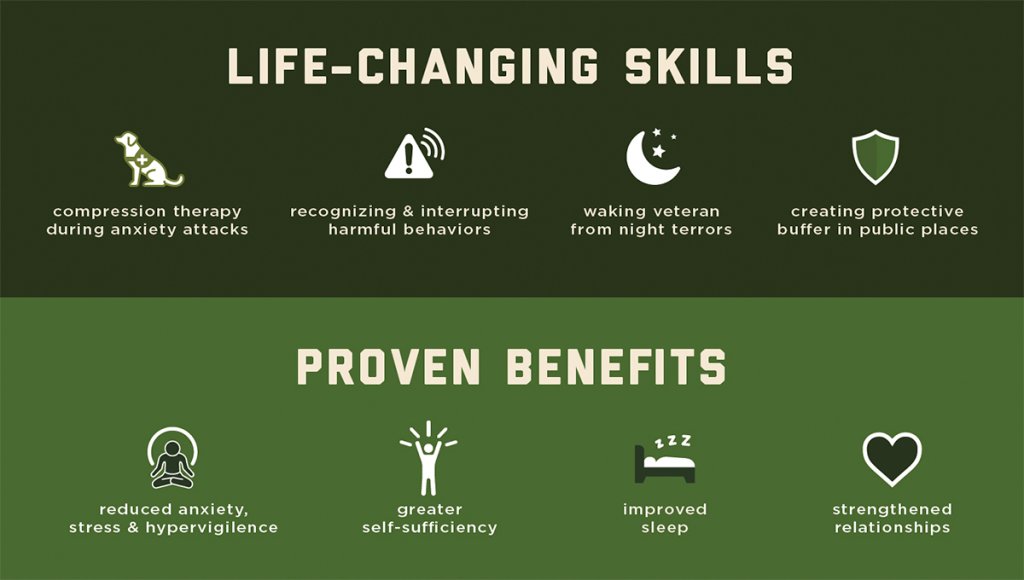
The following content is created in partnership with Purina Dog Chow. It does not reflect the work or opinions of the NBC Washington editorial staff. Click here to learn more about Dog Chow.
As part of it’s ongoing support of veterans and their families, Purina Dog Chow has launched its fourth annual Dog Chow Service Dog Salute, a campaign to highlight the life-changing benefits that service dogs provide to veterans experiencing Post-Traumatic Stress Disorder (PTSD). Stories of veterans and their service dogs come to life in the new Dog Chow documentary, Even Heroes Need Heroes, presented in its entirety below.
More than just a best friend, can a dog act as a security blanket? A mental health surrogate? A security guard? An interventionist? A gopher? A medical aide? When it comes to the service dogs who partner with PTSD veterans, canines can do all these jobs and more.
We're making it easier for you to find stories that matter with our new newsletter — The 4Front. Sign up here and get news that is important for you to your inbox.
Over 3 million military veterans experience Post-Traumatic Stress Disorder in ways that include nightmares, flashbacks, depression, anxiety, withdrawal, and hyperarousal. To help these vets, service dogs are trained to do everything from read minds to read the room. Really, these canines are the Navy SEALs of therapy pets.
Here are some ways service dogs work to help PTSD vets conquer their challenges.
Interrupting nightmares/panic attacks: During service, military vets may have experienced a traumatic event. Consequently, the vets may re-live these events in flashbacks or during sleep or in related panic attacks. During such episodes, their service dogs have been taught to sense what’s happening and trained to intervene by placing their body weight on the vets to promote a sense of calm.
Shannon, a U.S. Marine Corps vet who suffers extreme anxiety, said his dog Pepper did just that. “The very first time we stayed in the same room together, she alerted to the fact that I was in a nightmare,” Shannon says in the new Dog Chow documentary, Even Heroes Need Heroes. “And she did everything she was trained to do until she woke me up.”
Staging interventions: Those with PTSD may experience anxiety or start to engage in potentially harmful behavior. A service dog can be trained to recognize such conditions and behaviors, then intervene, distracting the vet. As interventions go, these can be rather pleasant and may include licking and nudging.
Creating buffers: Finding themselves in crowds or surrounded by others can give some PTSD vets anxiety, even claustrophobia. Service dogs are trained to recognize the perceived threat, then create a buffer zone around the veteran to separate them from others. In a similar vein, the canines can alert owners when someone approaches from behind.
Performing reconnaissance: Service dogs can scout out areas or rooms, searching for possible triggers or threats to vets. Or they can simply walk ahead of their handlers, peeking around corners to make sure no surprises await—and issue a warning if necessary.
Fetching and reminding: Not only can service dogs retrieve necessary items, like medications, they can, by way of their internal clocks, remind vets when it’s time to those medications.

Reducing depression: Being responsible for a service dog gives PTSD veterans a boost to keep going. The animals give their companions reasons to get out of bed and get outside for exercise. The relationship can even help suppress suicidal thoughts.
Tishawna, a U.S. Navy vet featured in the Dog Chow documentary, was suffering from depression and had attempted suicide. “Tishawna was always in the house; looking at the four corners of the walls; depressed; just wasn’t motivated at all,” says her former husband Carl. Then she teamed up with her service dog, Archie. “Now with Archie, I see her smiling,” Carl says. “I see her excited, like, Hey, let’s go outside today. Let’s go for a walk.”
Providing companionship: There’s the baseline way any dog provides love and companionship to their owners; then there’s the above-and-beyond feats a service dog can accomplish. The unconditional love and acceptance service dogs provide can help those with PTSD learn to trust—even love—again.
PTSD service dogs are proven to reduce the severity of PTSD symptoms and suicidal behaviors. Unfortunately, less than 1 percent of those in need of a service dog are able to get one each year. You can help Purina Dog Chow and their Service Dog Salute program to support the care and training of more service dogs for veterans with PTSD. Here’s how.

